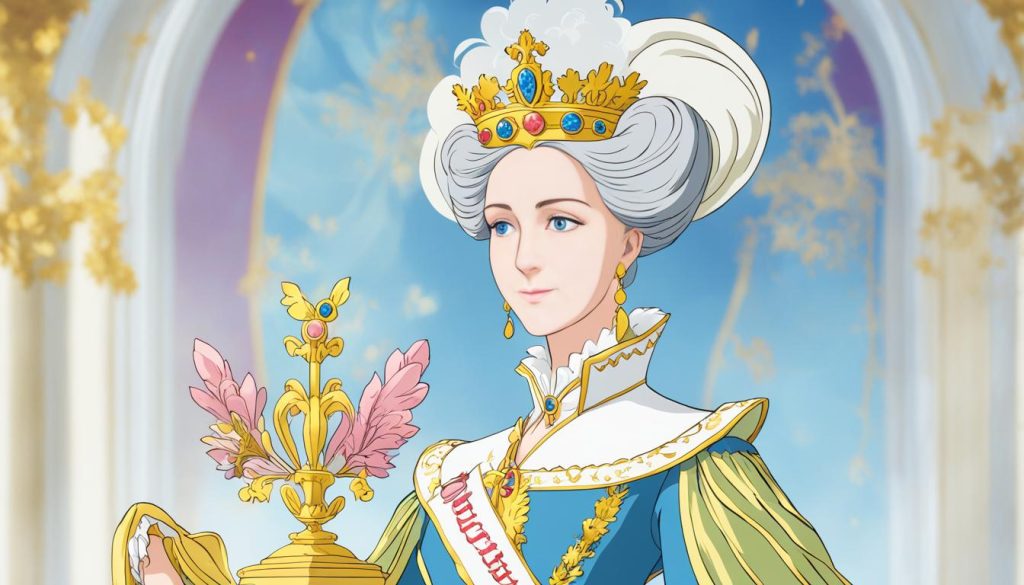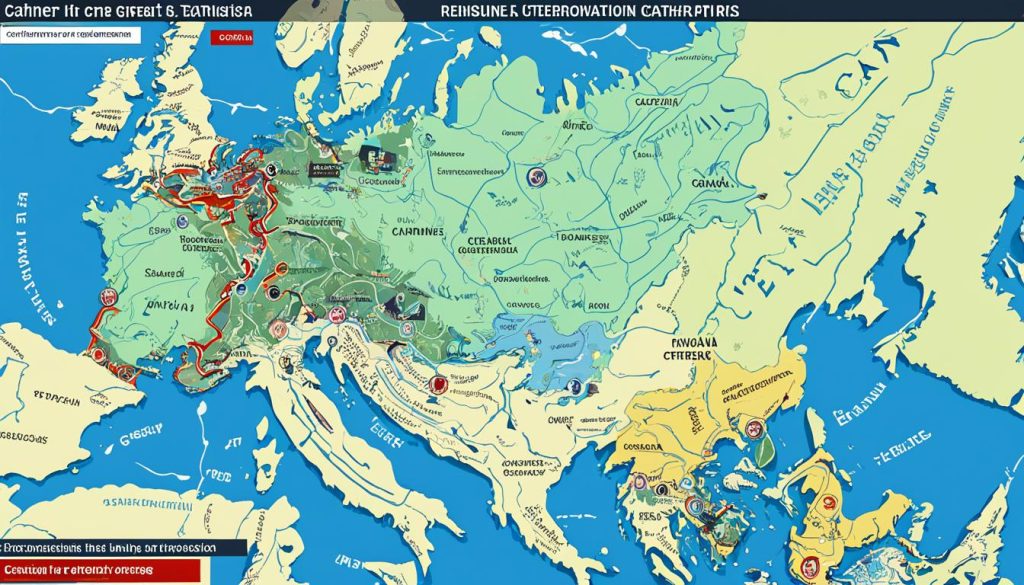Catherine the Great: Enlightened Empress Legacy Story

Step back in time to 18th-century Russia, where a remarkable figure named Catherine the Great left an indelible mark on Russian history. Born Sophie of Anhalt-Zerbst, this German princess would go on to become the beloved Empress of Russia. Her reign was a testament to ambition, intellect, and progressive governance, making her one of the most influential rulers of her time.
Key Takeaways:
- Catherine the Great, a German princess, became the Empress of Russia.
- Her reign was characterized by ambition, intellect, and progressive governance.
- Catherine’s legacy has had a lasting impact on Russian history.
- She implemented significant reforms and was influenced by the principles of the Enlightenment.
- Despite controversies and criticisms, Catherine’s contributions to Russian culture and administration are celebrated to this day.
Early Life and Rise to Power
Catherine the Great, originally named Sophia of Anhalt-Zerbst, was born into German nobility. As a young German princess, she married Karl Peter Ulrich, who was the nephew and heir of Empress Elizabeth I of Russia.
Determined to adapt to her new country, Catherine converted to Russian Orthodox Christianity, embracing the religious traditions of the land. This transformation played a crucial role in establishing her legitimacy and navigating the intricacies of Russian politics.
Following the death of her husband, Peter III, Catherine seized the opportunity to ascend to power. Her understanding of the political landscape, coupled with her strong alliances and support among the Russian nobility, made her rise to the throne relatively swift and seamless.
“I may never shine with the brilliance of the Romanovs, but I can strive to be their equal in purpose and devotion.”
With determination and strategic planning, Catherine the Great became the Empress of Russia, leaving an indelible mark on the nation’s history.
Reign as an Enlightened Absolutist
During her reign, Catherine the Great embraced the principles of the Enlightenment and ruled as an enlightened absolutist, striving to implement progressive reforms. Inspired by influential Enlightenment thinkers such as Voltaire, she sought to modernize and transform Russia. Corresponding with these thinkers, Catherine engaged in intellectual discourse, incorporating their ideas into her governance.
“Enlightened absolutism is the single greatest means for the ruler to attain the goal of true monarchy.” – Catherine the Great
One of Catherine’s significant contributions to the Russian legal system was the creation of the Nakaz. This document aimed to reform the legal system, promote justice, and establish a more equitable society. By codifying laws and regulations, Catherine sought to ensure fairness and consistency in the administration of justice throughout the empire. The Nakaz demonstrated her commitment to the principles of enlightened absolutism and her pursuit of a more progressive society.
Through her reign as an enlightened absolutist, Catherine the Great aimed to strike a balance between maintaining autocratic control and implementing reforms for the betterment of her people. By incorporating Enlightenment ideals into her governance, she sought to establish a more just and enlightened society in Russia.
Promotion of Education and Culture
During Catherine the Great’s reign, education and culture played a vital role in shaping Russia’s society and progress. Catherine placed a strong emphasis on these areas, recognizing their importance in fostering a prosperous and enlightened nation.
To improve education across the country, Catherine established primary and secondary schools in various regions of Russia. This initiative aimed to provide access to education to a wider population, ensuring that knowledge and learning were not restricted to the elite. Furthermore, Catherine paved the way for higher education opportunities for noble women, recognizing their potential contributions to society.
As a patron of the arts, Catherine’s reign witnessed a flourishing of Russian culture. She had a deep appreciation for literature and actively supported and promoted writers, playwrights, and thinkers of her time. Catherine herself made significant contributions to Russian literature, penning memoirs, plays, and correspondence that reflected her intellectual curiosity and love for the arts.
“Literary patronage is not mere charity; it is an investment in a nation’s cultural soul. It is through the recognition and support of talented individuals that Russian culture thrived under Catherine the Great’s rule.”
Catherine’s commitment to education and culture had a profound impact on Russian society and identity. It paved the way for the development of a more educated and enlightened population, fostering a sense of pride in Russian culture and heritage. Her dedication to promoting education and nurturing artistic talent left an indelible mark on the cultural landscape of Russia.
Expansion and Modernization of Russia
During Catherine the Great’s reign, Russia experienced significant territorial expansion, as well as crucial advancements in administrative reforms, trade expansion, and modernization. Catherine’s ambitious vision propelled her to expand Russia’s borders westward and southward, ultimately gaining access to the Bosporus Strait.
One of Catherine’s notable accomplishments was her implementation of administrative reforms. She aimed to improve the efficiency of the government and enhance the well-being of her subjects. Catherine built new towns and fortifications, facilitating the growth and development of these regions.
Furthermore, Catherine’s focus on trade expansion greatly benefited Russia’s economy. She established trade routes and encouraged foreign investments, leading to increased economic growth and prosperity. The development of commerce and communication networks during her reign further contributed to Russia’s modernization.

“The expansion of Russia’s territories under Catherine the Great opened new frontiers for the empire, transforming it into a major power in Europe.” –
Controversies and Criticisms
Despite her accomplishments, Catherine the Great faced criticism for her personal life and autocratic rule. Her private life, characterized by numerous lovers and changing favorites, attracted attention and scrutiny from both contemporaries and historians. Critics argue that her romantic entanglements and volatile relationships influenced her decision-making and governance.
Furthermore, Catherine’s autocratic rule, although effective in many ways, drew criticism from those who believed in a more democratic form of government. As an absolute ruler, she possessed significant power and control, which some viewed as oppressive and disregarding the voices of the people.
“Her amours and the way she proceeded to choose her lovers do credit to her intelligence and ability, but they also show the faults of her character and occasionally give rise to unfavorable judgments about her.”
While Catherine’s energy, administrative ability, and achievements are acknowledged by critics, they contend that her accomplishments were shaped by her close associates and the historical context of Russian society at the time.
A broader understanding of Catherine’s reign requires an examination of the complexities involved in her private life, critics’ perspectives, and the influence of her autocratic rule on the society she governed.
Unveiling Catherine’s Private Life
The private life of Catherine the Great, including her romantic relationships and personal choices, continues to captivate historians and biographers. It offers insights into her character and sheds light on the challenges she faced as a powerful female ruler in a time of political turmoil.
Autocracy and Critiques of Power
The autocratic nature of Catherine’s rule drew criticism from those who desired a more participatory form of governance. This debate raises questions about the balance between an individual ruler’s power and the interests of the governed.
Historical Context and Individual Agency
Critics argue that Catherine’s achievements were influenced by the historical development of Russian society and the intellectual climate of the time. They contend that individual agency must be considered within the broader social and political context of the era.
Legacy and Impact
Catherine the Great’s reign continues to have an enduring influence on Russia, leaving a significant impact on various aspects of the country. Her accomplishments and reforms have shaped Russian culture, administration, and territorial expansion.
As a symbol of Russian pride, Catherine is celebrated for her role in the historical development of the nation. Her reign marked a period of growth and progress, solidifying Russia as a major European power.
Under Catherine’s leadership, Russian culture experienced a renaissance. She actively promoted the arts and literature, becoming a renowned patron of artists and writers. Her own contributions to literature, including plays, memoirs, and correspondence, highlight her intellectual curiosity and literary talent.
Furthermore, Catherine’s administration brought about significant changes to the social and economic landscape of Russia. Her policies and reforms modernized the country’s bureaucracy, legal system, and education. Through the establishment of primary and secondary schools, as well as opportunities for higher education for noble women, she fostered educational development and social mobility.
Catherine’s territorial expansion further solidified Russia’s dominance and extended its influence. Through military victories and strategic alliances, she expanded the Russian Empire westward and southward, gaining access to vital trade routes and vitalizing the economy.
“Catherine the Great’s legacy is firmly rooted in the historical development of Russia. Her accomplishments in culture, administration, and territorial expansion continue to shape the nation’s identity and pride.”
In summary, Catherine the Great’s legacy and impact on Russia’s historical development are undeniable. Her enduring influence can be seen in the cultural achievements, administrative reforms, and territorial expansion that took place during her reign. Catherine’s legacy is a testament to her vision, leadership, and contributions to the country’s growth and progress.
Notable Achievements and Reforms
Catherine the Great’s reign was marked by a series of remarkable achievements and impactful reforms that shaped the course of Russian history. Her visionary leadership and strategic decisions propelled Russia to new heights, both internally and on the global stage. From territorial expansion to administrative reforms, Catherine’s reign witnessed significant progress and transformation.
One of Catherine’s notable achievements was her successful expansion of Russian territories. Through strategic military campaigns and diplomatic negotiations, she secured significant gains for the empire. These military victories not only expanded Russian borders but also consolidated her power and influence in the region.
In addition to territorial expansion, Catherine implemented sweeping administrative reforms that modernized Russian society. She aimed to strengthen governance, improve the efficiency of the bureaucracy, and promote fairness and justice. These reforms paved the way for a more organized and efficient administrative system, setting the stage for future progress and development in Russia.
Furthermore, Catherine focused on improving trade and communication networks. She invested in infrastructure projects, such as the construction of new towns and the expansion of trade routes. These efforts led to increased commerce, economic growth, and improved connectivity within the empire, fostering a prosperous and interconnected society.
Catherine’s reign also witnessed advancements in education and culture. She prioritized the promotion of education by establishing primary and secondary schools across Russia, providing opportunities for the populace to acquire knowledge and skills. Additionally, Catherine’s patronage of the arts and her own contributions to literature enriched Russian culture and intellectual life.
Overall, Catherine the Great’s notable achievements and reforms encompassed territorial expansion, administrative improvements, trade and communication advancements, and the promotion of education and culture. Her reign played a pivotal role in the modernization of Russia and left a lasting legacy that continues to shape the nation’s trajectory to this day.
Personality and Character
Catherine the Great was a woman of remarkable ambition, ego, and intellectual curiosity. Her character was shaped by her interactions with prominent Enlightenment thinkers and her drive to leave a lasting legacy in Russia.
One of Catherine’s notable qualities was her ambition, driving her to undertake grand projects and pursue expansions of both territory and influence. Her determination to modernize and transform Russia was fueled by her unwavering desire for greatness.
Her intellectual curiosity was a driving force behind her engagement with Enlightenment philosophy and the pursuit of knowledge. Catherine formed friendships with influential thinkers of her time, such as Voltaire, and regularly corresponded with them, discussing ideas and seeking guidance.
Through her extensive writings, Catherine showcased her intellectual prowess and showcased her commitment to the arts, sciences, and literature. Her enlightened mindset and love for knowledge were evident in her correspondence, essays, and speeches.
“Only great men can have great faults.”
– Catherine the Great
While Catherine’s intellectual pursuits and ambition were admired, her ego sometimes overshadowed her achievements. Her desire for personal glory led to an inclination for self-promotion and a tendency to take credit for the successes of others.
Despite her admirable qualities, Catherine was not without flaws. Her ambition sometimes pushed her towards autocratic rule, leading to criticisms and discontent among her subjects. Her pursuit of personal interests occasionally overshadowed her intentions to rule in the best interests of all.
Overall, Catherine the Great’s personality and character were a complex mix of admirable qualities, such as ambition and intellectual curiosity, alongside flaws stemming from egotistical tendencies. Her legacy as an enlightened ruler continues to resonate and inspire to this day.
The Question of Rule in the Common Good
Catherine the Great’s reign as an enlightened absolutist raises important questions about the ability of a single ruler to govern in the interests of all. While she implemented progressive reforms and claimed to act for the common good, her rule was not without contradictions and controversies.
“It is an unpleasant task to be obliged to keep one’s eyes open, to look painfully and see that even among my closest associates there are tall grudges or secret ambition.”
Catherine believed in the concept of enlightened absolutism, where she ruled with the intention of promoting the welfare and progress of her subjects. She corresponded with influential Enlightenment thinkers such as Voltaire and implemented reforms based on their ideas. However, the reality of governing a vast empire with diverse needs and interests presented inherent challenges that created a contradiction in her pursuit of the common good.
While Catherine’s reforms aimed to improve the lives of her subjects, there were instances where her rule fell short. For example, her policies on serfdom did little to improve the condition of the majority of the population, who remained tied to the land and subject to the whims of their noble landowners. Additionally, her autocratic rule, though efficient in many ways, limited the participation of the general population in the decision-making process.
It is impossible for any ruler, no matter how well-intentioned, to govern in the interests of all. The complexities of governance, the limitations of power, and the conflicting needs of a diverse population make it challenging to achieve a perfect balance. Catherine’s rule exemplifies this contradiction, where her enlightened ideals and progressive reforms existed alongside the limitations imposed by autocracy and the realities of governing a large empire.
Contradictions in Action
Catherine’s efforts to promote education and culture, while commendable, were largely limited to the noble classes. Although she established primary and secondary schools and provided higher education opportunities for noblewomen, the majority of the population remained uneducated. This contradiction highlights the challenges of implementing widespread reforms in a society marked by social divisions and a hierarchical class structure.
Another contradiction lies in Catherine’s territorial expansion. While she aimed to strengthen Russia’s position on the global stage and secure its borders, this expansion came at a cost to the indigenous populations of the acquired territories, who often faced coercion and oppression. The pursuit of empire and the propagation of enlightened ideals sometimes clashed, underscoring the complexities of ruling in the common good.
“No one is more surprised than I that, even in my old age, I became a mighty ruler in exempting Russia from tyranny, and carrying out wise and good laws to that end.” – Catherine the Great
In conclusion, Catherine the Great’s rule as an enlightened absolutist highlights the inherent contradiction of governing in the common good. While she implemented progressive reforms and aspired to act in the best interests of her subjects, the challenges of governance and the limitations of power often resulted in contradictions and discontent. Her reign serves as a valuable case study in the complexities and contradictions faced by rulers throughout history.
Conclusion
Catherine the Great, with her enduring legacy, has made significant contributions to Russian history, culture, and governance. Her remarkable feats and implementation of significant reforms have left an indelible mark on the nation’s development. However, her reign was not without controversies and criticisms, resulting in a mixed legacy.
Catherine’s achievements include territorial expansion, administrative reforms, improvements in trade and communication, and military victories. Her reign witnessed the creation of new towns, the modernization of Russian society, and advancements in education and culture. These contributions attest to her ambition and desire for progress.
Nevertheless, Catherine’s rule faced criticism due to her personal life and autocratic tendencies. Critics argue that her achievements were influenced by her associates and the historical development of Russian society. Her mixed legacy prompts a nuanced understanding of her reign, where the admirable qualities are accompanied by flaws.
Overall, Catherine the Great’s enduring legacy leaves an impactful and complex story in Russian history. Her contributions continue to shape the nation, and her reign’s influence can be seen in various aspects of Russian culture, administration, and territorial expansion. With both achievements and controversies, Catherine’s rule serves as an important chapter in Russia’s historical development.
Thanks For Reading…Peter III: Russia’s Enigmatic Eighteenth-Century Tsar
How much did you like Peter III: Russia’s Enigmatic Eighteenth-Century Tsar? Please share your views in the comment box. Also, please share this story with your friends on social media so they can enjoy it, and for more such stories, please bookmark storiespub.com.
Check out other stories that we have:
























